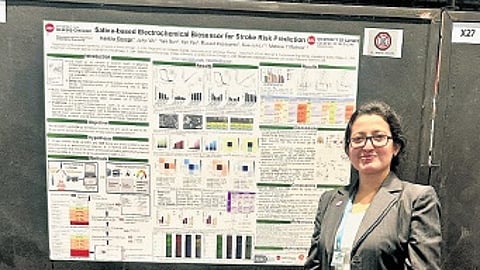

THIRUVANANTHAPURAM: What if a simple drop of saliva could foretell the risk of a stroke, the early onset of diabetes, or even mouth cancer? For Haritha George, who hails from Thiruvananthapuram and recently earned her PhD in Biomedical Engineering from the University of Illinois Chicago, that question was not just theoretical - it became the life of her research.
At a time when healthcare systems around the world are trying to shift from reactive treatment to proactive care, Haritha’s work brings a possibility closer to reality. Her doctoral project, titled ‘Intelligent Salivary Biosensors for Systemic Disease Risk Prediction,’ explored how biomarkers in saliva can be used to predict serious systemic diseases long before symptoms appear.
“After completing my bachelor’s from Kerala University and my master’s in biotechnology from West Bengal University in Kolkata, I worked in Dubai for a while. It was during that time, that I met my mentor, Mathew T Mathew. When he received the NIH R01 multi-PI grant for research in salivary diagnostics, he was one of the principal investigators. He encouraged me to apply as a doctoral researcher under his guidance, and I got through. That’s how it all started,” says Haritha.
In 2022, as the world began adjusting to the post-pandemic landscape, Haritha George joined the University of Illinois Chicago’s College of Medicine Rockford campus to begin her research journey.
“Our campus was a hub for saliva-based COVID testing. Being surrounded by cutting-edge work in non-invasive diagnostics made me wonder if saliva, the same fluid we used to detect covid, could also reveal more about a person’s overall health?” she says.
Her idea was to explore that potential. By combining electrochemical sensing techniques with machine learning, she developed a method to detect specific molecules in saliva linked to stress, inflammation, and diseases like oral cancer, diabetes, and stroke, all without needing a single drop of blood.
“As a ground-up method, I simulated disease conditions using artificial saliva with varying biomarker levels and built electrochemical sensors and machine learning models around it. When we tested the system with real saliva samples, the results confirmed that what is happening in the mouth can show what is going on deeper in the body,” she adds.
Haritha states that the idea is to eventually turn this into a small, portable tool that can be used in dental clinics, workplaces, or even homes.
“It could help catch diseases early and also track how someone is responding to treatment by watching changes in these saliva markers.”
By turning complex lab science into a user-friendly tool, Haritha’s vision is to make health assessments more accessible and data-driven. For now, the device remains a prototype, but it’s already gaining interest among researchers and clinicians.